Pro Racing Returns to Maine's Sugarloaf With the EWS, on Trails Built by Olympian Adam Craig
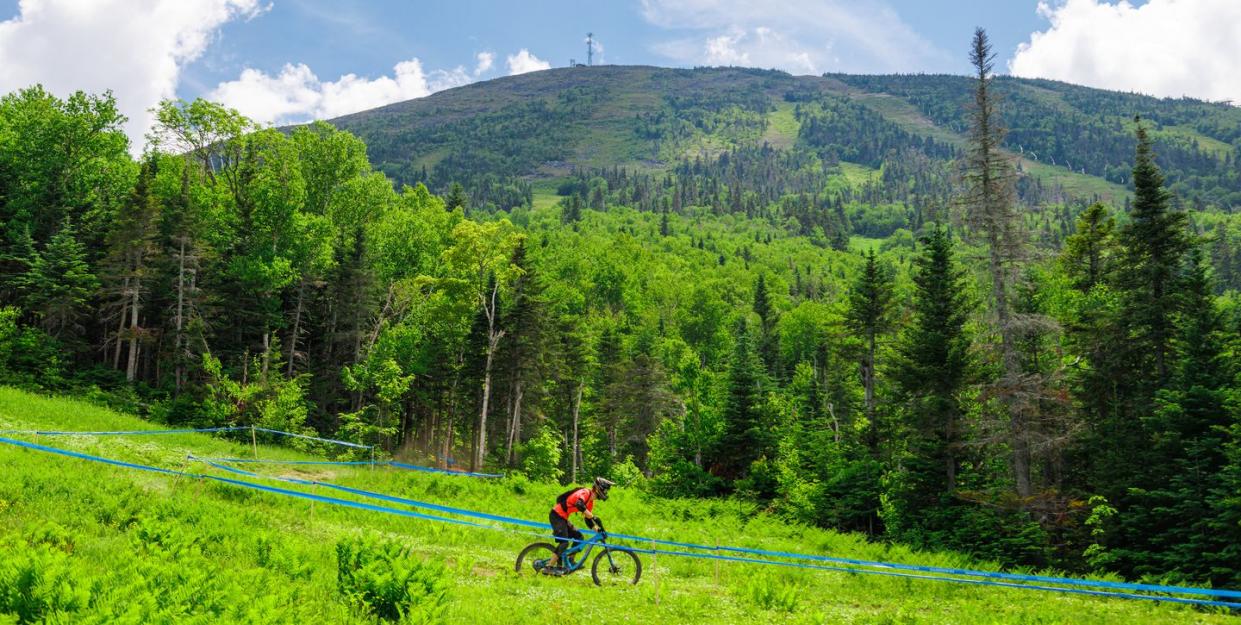
On August 20 and 21, the Enduro World Series will race at Sugarloaf mountain resort in Maine, on trails built by Olympic mountain biker Adam Craig.
Sugarloaf was once a big hub for mountain bike racing in the 90s, and now, the mountain is looking to return to its roots, with enduro races and a future lift-service bike park.
The Enduro World Series will feature pro riders from around the world. Sugarloaf is the second U.S. stop in the series this year, after Burke, Vermont.
This weekend, on August 20 and 21, Sugarloaf mountain in Maine is playing host to the Enduro World Series (EWS), marking a massive comeback for the resort in the sport of mountain biking. The event will see the best enduro pros from around the world line up to race on fresh trails built by Olympic mountain biker and Maine local Adam Craig.
There’s an unmistakable “Back to the Future” quality to the EWS coming to Sugarloaf. During the 90s, Sugarloaf, one of New England’s premier ski destinations, jumped on the mountain biking bandwagon by hosting one of the region’s top cross-country races, the Widowmaker Challenge (named after a legendary ski run). Among the youngest, and best, racers to line up for that annual sufferfest was Craig, a then teenager from Exeter, Maine.
Craig raced shoulder-to-shoulder alongside regional stars, like Maine’s Peter Webber and Vermont’s Andy Bishop, and would go on to have an impressive career that included five national titles, World Cup appearances, and a spot on the 2008 Olympic team at the Beijing Games. He relocated to Bend, Oregon, so he could train year-round. Toward the end of his career, Craig’s racing specialty morphed from cross-country to enduro, a mountain bike stage race where riders are timed on descents. A longtime Giant-sponsored racer, he continued his association with the brand as an ambassador and trail advocate—then the pandemic hit.
“I started spending more time back in Maine,” Craig says. “Bike events all shut down for 2020, and it allowed me more time to visit with my folks… The connections I made at Sugarloaf started coming together, and this project started to take some shape.”
The 41-year-old Craig returned to his roots, taking up residence in the Bigelow Mountains of western Maine as Sugarloaf’s manager of mountain bike events and initiatives. He brought decades of trail-building proficiency developed while living in Bend, working with mentors like Paul Thomasberg of Terra Velo Solutions, Todd Olsen of the federal Bureau of Land Management, and Kevin Rowell and Brandon Haraughty of the U.S. Forest Service.
“I’m applying that knowledge to this environment,” he says of his work at Sugarloaf.
Craig’s return coincides with a revitalization of mountain biking at Sugarloaf. Shortly after the turn of the century, as interest in local cross-country racing waned, resort executives made a business decision and opted to focus on Sugarloaf’s golf facilities. Fat-tire activities became an afterthought.
That created a void, but it was filled by a group of passionate year-round outdoor enthusiasts, including many residents and skiers with second homes in the area. The town of Carrabassett Valley, the Carrabassett Valley chapter of the New England Mountain Bike Association, and the pioneering non-profit Maine Huts & Trails banded together to start building and maintaining the current 77 miles (and planned 100 miles) of trails on both sides of the Carrabassett River. The sprawling trail system included Sugarloaf’s Nordic network (managed by the town), but not the resort’s alpine trails.
More recently, however, the resort joined the other three groups to form Carrabassett Valley Trails, an effort led by Brenna Herridge, Sugarloaf’s director of sales and an avid mountain biker. In the fall of 2020, Craig connected with Herridge “to get momentum going up on the mountain again,” he says, and volunteered to put in a trail from the top of the Whiffletree superquad chairlift. Herridge expressed interested in having Sugarloaf host enduro races, but they needed the right trails first. Over that winter, with Craig’s trail-building expertise, they worked with the Maxxis Eastern States Cup—a regional enduro and downhill race series—crew to plan a race for September 2021.
“So we just sort of scratched the trails in, and it was fun… We hit the ground with five trails on the mountain,” Craig says. “We had a really wonderful, scrappy volunteer effort, which was the local mountain bike community. They got wind of what we were doing, and came out and helped out a ton.”
The success of last year’s Eastern States Cup convinced Craig and Herridge that Sugarloaf could host an EWS-level event, and officials with the Scotland-based tour agreed. This year’s Eastern States Cup race at Sugarloaf, on June 26, also served as an EWS qualifier. The EWS event at Sugarloaf, coming a week after the EWS stop at Burke Mountain in Vermont’s Northeast Kingdom, is expected to draw roughly 400 racers, including an elite cast of 250 international competitors.
“We’re stoked to have the opportunity to have people come out and enjoy some new trails on the mountain,” says Craig. “What better way to do that than to invite the world’s best riders.”
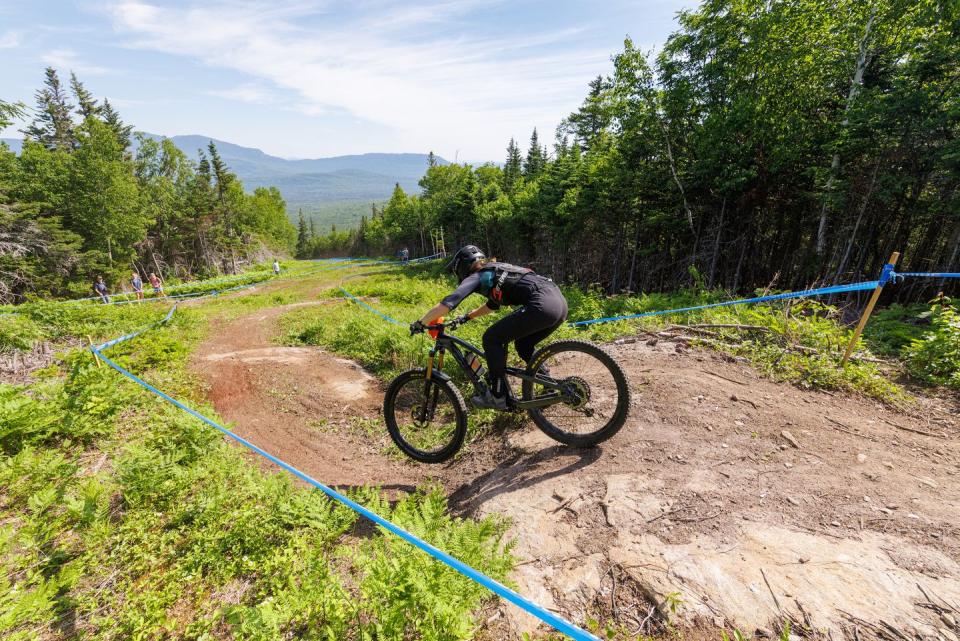
The EWS events at Burke and Sugarloaf are the only two U.S. stops in the series of 11 races, which will also visit Canada, Australia, New Zealand, Austria, and Slovenia this year. But the two events, though separated by a three-hour drive, will present competitors with night-and-day racing.
“The riding at Burke is pretty developed, and it has been for quite some time,” says Craig. “Those are all really mature trails. There’s a lot more bedrock at Burke, and the trails are just older and more ridden. They’ve done tons of great work, and the trails ride really well. It’s definitely a different character… Everything we have here is pretty darn new. It’s fresh. I think they’re really good complementary events.”
Though “fresh,” the gravity terrain at Sugarloaf, much like Craig’s presence, elicits the same throwback vibe. Three decades ago, when Sugarloaf and neighboring resort Sunday River ruled the Maine mountain-biking roost, the trails were tough—steep, sketchy, twisting, narrow singletrack— and treacherous when wet. That’s one reason, Craig suspects, that mountain biking faded from the summer amenities at those resorts.
“The reality was, if you didn’t have the downhill bike and the skills to ride it, you really couldn’t ride those trails, so the business didn’t really grow,” says Craig. “They chose not to make the investment required to go with flow trails and beginner friendly trails.”
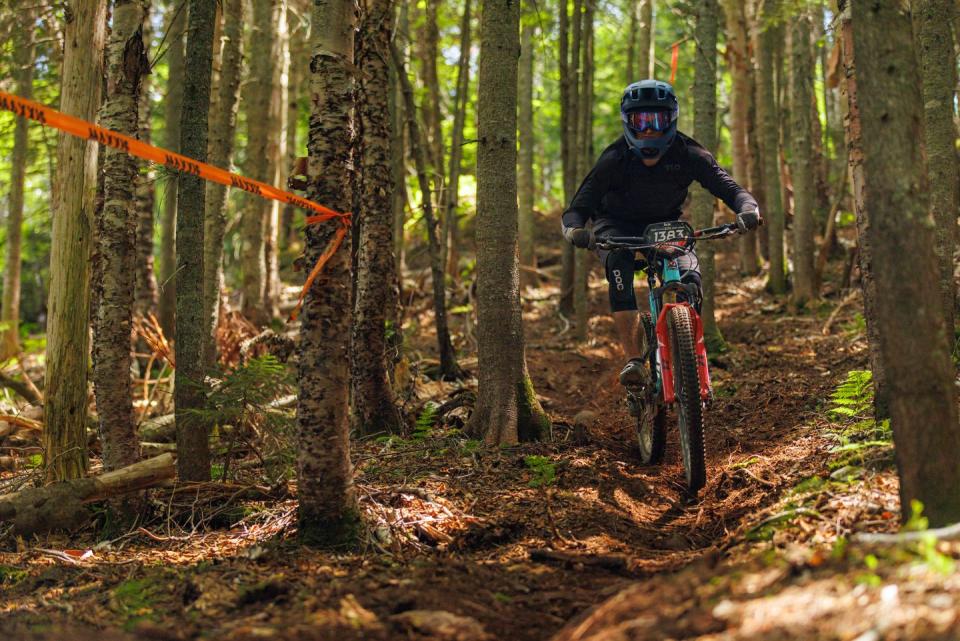
“But nowadays, the bikes—the standard, middle-of-the-road mountain bike that you can walk into a bike shop and get for a reasonable price—is totally capable of riding the steepest, most technical trails we have up here on the mountain,” he says. “There are just more riders that have good equipment and the skills to do it now, so there’s more interest in the enduro style of riding.”
As a result, the trail network built by Craig, his crew of two (Sam Rhoads and Carter Lawless), and a cadre of dedicated volunteers, will warm the knobby heart of any old-school rider.
“They’re natural trails that really work well with the landscape… They’re just rocky and rooty and rough,” says Craig. “But I like to keep momentum in the ride, so the turns are pretty round and the lines are pretty smooth, relatively speaking. The rocky terrain at Sugarloaf is the challenge. The key is careful planning and layout of the trails. We intentionally use some rock features, avoid others, and usually are moving lots of rocks during the process.”
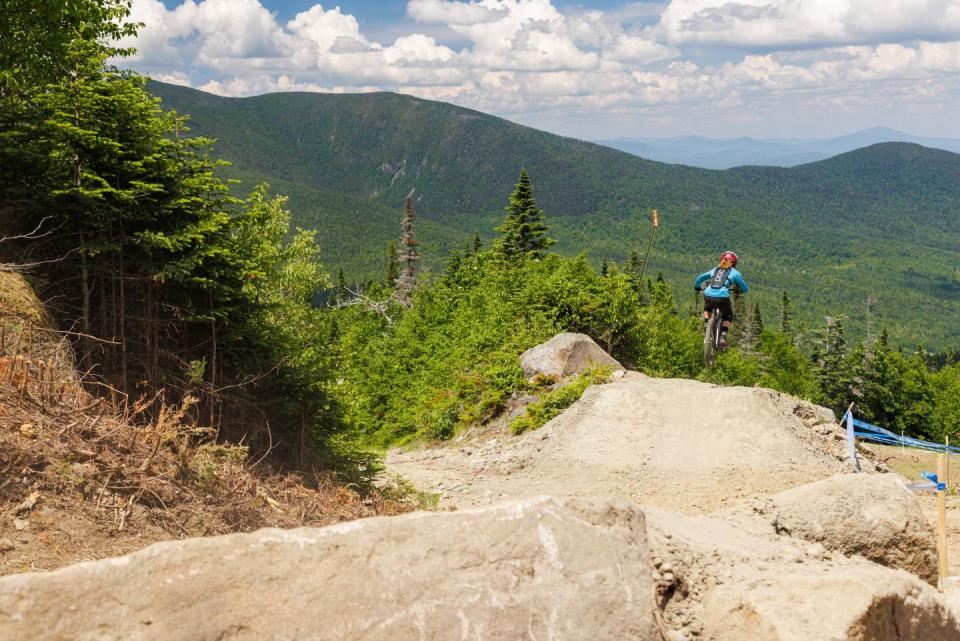
Though Sugarloaf tops out at more than 4,200 feet above sea level, Craig says only one of the five enduro trails, the “pro stage,” will run from the summit, taking just under 10 minutes to complete. (“Big mountains are sweet to look at, but they’re tough to ride down,” he says.) The other four will be fast and furious, starting at roughly 3,200 feet and running only three to five minutes. The lowest cumulative time over those six runs—competitors ride the summit course twice—wins.
“The trails certainly weave in and out of the ski runs and forests,” says Craig. “We use the ski runs to traverse ground where the forest is too rocky or wet, but try to stay in the woods as much as possible, and have been able to replace a bunch of open slopes with trails this summer.”
“I love the old-school feel of racing down an open ski slope,” he says. “Riders can expect some type of fun trail feature at most of the transitions between forest and slope, and spectators can expect good action here—high speeds and airtime.”
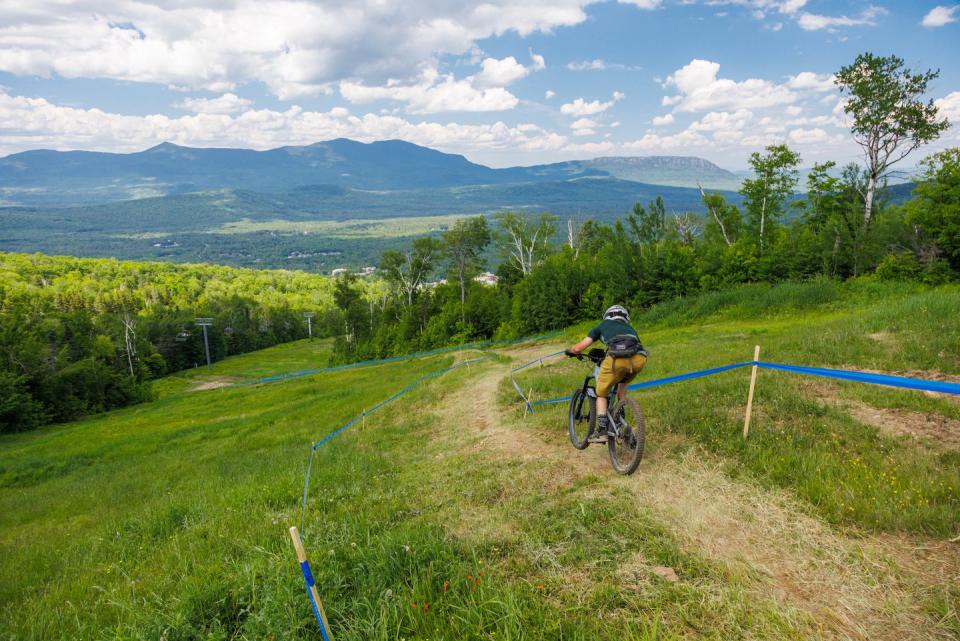
Much like the Widowmaker Challenge was intended to introduce racers to Sugarloaf’s trail network in the 90s, Craig says he hopes the EWS will act as a springboard for the resort’s plans to expand into a full lift-service mountain bike park, with more beginner and intermediate terrain.
“We’re really excited,” he says. “It’s been fun the past two years, building these double black diamond race courses, because we could do that quite quickly and at a fairly modest cost.”
“That’s a great way to get a foothold and get the resources on the hill,” says Craig. “But we’re about to shift into building trails for the entire community to be able to enjoy, rather than just the more experienced members.”
Which, in short, means Sugarloaf’s future looks bright.
You Might Also Like

